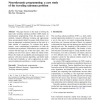Free Online Productivity Tools
i2Speak
i2Symbol
i2OCR
iTex2Img
iWeb2Print
iWeb2Shot
i2Type
iPdf2Split
iPdf2Merge
i2Bopomofo
i2Arabic
i2Style
i2Image
i2PDF
iLatex2Rtf
Sci2ools
NCA
2008
IEEE
2008
IEEE
Neurodynamic programming: a case study of the traveling salesman problem
The paper focuses on the study of solving the large-scale traveling salesman problem (TSP) based on neurodynamic programming. From this perspective, two methods, temporal difference learning and approximate Sarsa, are presented in detail. In essence, both of them try to learn an appropriate evaluation function on the basis of a finite amount of experience. To evaluate their performances, some computational experiments on both the Euclidean and asymmetric TSP instances are conducted. In contrast with the large size of the state space, only a few training sets have been used to obtain the initial results. Hence, the results are acceptable and encouraging in comparisons with some classical algorithms, and further study of this kind of methods, as well as applications in combinatorial optimization problems, is worth investigating. Keywords Neurodynamic programming
Computer Networks | Large-scale Traveling Salesman | NCA 2008 | Salesman Problem | Temporal Difference |
Related Content
| Added | 14 Dec 2010 |
| Updated | 14 Dec 2010 |
| Type | Journal |
| Year | 2008 |
| Where | NCA |
| Authors | Jia Ma, Tao Yang, Zeng-Guang Hou, Min Tan, Derong Liu |
Comments (0)

